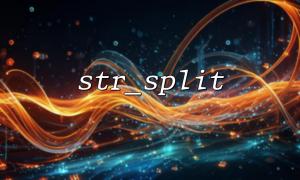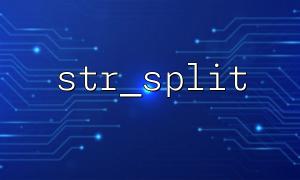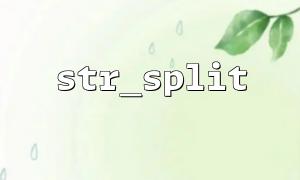In PHP, str_split is a very useful function that can split a string into an array. By cleverly utilizing str_split , we can not only split the string into multiple single characters, but also achieve some interesting string processing effects such as cross-output. Today we will discuss how to use the str_split function to implement the cross-out output of strings.
The str_split function splits a string into an array. Its basic syntax is as follows:
str_split(string $string, int $length = 1): array
$string : The string to be split.
$length : Specifies the length of each array element, default is 1.
For example, use str_split to split a string "HelloWorld" into a single character array:
$string = "HelloWorld";
$array = str_split($string);
print_r($array);
Output:
Array
(
[0] => H
[1] => e
[2] => l
[3] => l
[4] => o
[5] => W
[6] => o
[7] => r
[8] => l
[9] => d
)
Through str_split , the string "HelloWorld" is split into an array of each character.
Cross-out refers to the alternate output of two string characters in order. For example, suppose there are two strings "abc" and "123" , the result after cross-out should be "a1b2c3" .
Suppose we have two strings, we can first use str_split to split them into arrays, and then output these arrays alternately. Let's take a look at the implementation code:
<?php
function cross_output($str1, $str2) {
// Use two strings str_split Split into arrays
$arr1 = str_split($str1);
$arr2 = str_split($str2);
// Get the maximum length of two arrays
$max_length = max(count($arr1), count($arr2));
// Used to save the crossover results
$result = '';
// Cross output by maximum length
for ($i = 0; $i < $max_length; $i++) {
if (isset($arr1[$i])) {
$result .= $arr1[$i];
}
if (isset($arr2[$i])) {
$result .= $arr2[$i];
}
}
return $result;
}
$str1 = "abc";
$str2 = "123456";
echo cross_output($str1, $str2); // Output: a1b2c3456
?>
Split string: Use str_split to split the two strings passed into arrays $arr1 and $arr2 .
Get the maximum length: We get the maximum length of two arrays, making sure we can traverse to the last element of the longest array.
Alternate output: Use a for loop to loop through the array and add characters one by one. If an index of an array has a value, it is added to the result string.
In actual development, it may involve processing strings with URLs. For example, we might need to cross-out a string with a URL. In this example, we assume that we have a string containing URLs, which we want to output alternately, but need to replace the domain name in the URL with m66.net .
Suppose we have the following string:
$str1 = "http://example.com/page1";
$str2 = "https://example.com/page2";
When we output, replace the domain name in the URL with m66.net , and the code is as follows:















